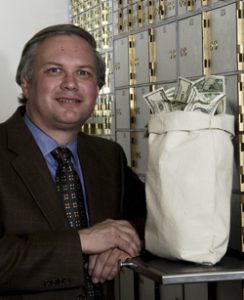Software Supplier Draws on UA Data Mining Expertise in Battle Against Money Laundering
by Niko Corley

Money laundering, according to news accounts, is the world’s third largest business, a business so large that it is nearly impossible to even estimate the volume. The United Nations Crime and Justice Database describes the crime being officially recorded at national levels in more than 80 countries.
It adversely affects financial institutions and entire economies, creating changes in demand for money, exchange and interest rate volatility, heightened risks to asset quality and asset price bubble. Terrorist activities are sometimes funded from the proceeds of illegal activities, and perpetrators must find ways to launder the funds in order to use them without drawing the authorities’ attention.
A recently negotiated partnership with SAS, a leading software supplier to the world’s financial services industry, has engaged The University of Alabama’s Culverhouse College of Commerce in business research on a global scale, research that could be part of an effort to slow the pace of money laundering by terrorist groups.
A research team, comprised of a dozen UA students in statistics and data mining and headed by Dr. J. Michael Hardin, professor of statistics and a data mining specialist, is investigating questions posed by financial institutions using SAS software to detect money laundering, score credit reports and perform other data mining tasks.

“Money laundering and terrorist financing are not typically linked to financial instability, but they should be,” notes the International Money Fund website. “These activities are not just the by-products or precursors to often serious criminality and even acts of barbarism; they also taint otherwise unaffected people and institutions.”
Banks are required to comply with a host of regulations designed to deter money laundering and terrorist financing, including screening customers against government-supplied terrorist lists and reporting suspicious activity to law-enforcement and regulatory authorities.
Considering this, plus the high-profile corporate scandals that have plagued the business world in recent years, it is not surprising that software companies report sales and installations of anti-money laundering and regulatory compliance software are up sharply.
Inevitably, institutions using SAS products will have questions regarding the software and the implementation of methods for conducting business that these programs advocate, Hardin said. Occasionally, requests are beyond that which SAS has can answer.
“These are questions that SAS staff does not have the time to address,” Hardin said.
The questions sometimes require a great deal of research to answer, which is where UA now plays a crucial role. SAS has provided the UA team with the necessary programs for answering these questions. This includes the newest credit scoring and money laundering software, in addition to the data mining programs already in use. Hardin said he believes his team of students is servicing the global financial community, gaining valuable work experience and maybe even making the world a safer place to live.
“By partnering with SAS, our students are not just isolated with academic research, they can see the translation in a real world setting,” Hardin said.
This research partnership has also paved the way for other programs. A UA/SAS summer internship, a credit scoring conference, and a one-day credit-scoring course for students and local banks are all under development.
Hardin, whose background is in data mining and credit scoring, has worked with SAS since 1997 as a consultant and was instrumental in establishing the partnership with the University. He believes academic institutions can be extremely valuable to SAS in the future.
“I think UA will serve as a test case for SAS in working with universities,” Hardin said.
Further Reading
Contact
Richard LeComte, UA Public Relations, 205/348-3782, rllecomte@advance.ua.edu
Source
Betsy Irwin, education outreach coordinator, 205/371-2234, birwin@ua.edu